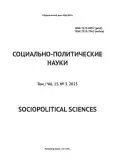The Formation of Media Literacy in the Academic Environment: Socio-Cultural Codes and Digital Identities of Russian University Teachers
- Авторлар: Garaganov A.V.1, Glebova I.S.2
-
Мекемелер:
- Financial University under the Government of the Russian Federation
- Institute of Cinema and Television
- Шығарылым: Том 15, № 3 (2025)
- Беттер: 145-152
- Бөлім: Sociology of management
- URL: https://journals.eco-vector.com/2223-0092/article/view/687899
- DOI: https://doi.org/10.33693/2223-0092-2025-15-3-145-152
- EDN: https://elibrary.ru/SIAONE
- ID: 687899
Дәйексөз келтіру
Аннотация
The article examines the process of media literacy formation among Russian university teachers in the context of the digital transformation of education. Based on in-depth interviews with teachers, the authors reveal that media literacy acts not only as a set of technical skills, but also as a complex space for the formation of new digital identities, where professional, personal and socio-cultural codes intersect. Special attention is paid to the analysis of strategies for mastering media technologies: from formal training to self-education and the horizontal exchange of experience within professional communities. It is shown that the level of media literacy of teachers is heterogeneous and is largely determined by personal motivation, values and communication style. Media literacy is becoming an integrative competence that combines pedagogical experience, digital tools and emotional maturity, as well as an essential resource for building trust with a youth audience and maintaining competitiveness in the academic environment. The authors emphasize the importance of teamwork, mentoring, and institutional support, as well as the need for a differentiated approach to media literacy education. It is noted that the development of media literacy contributes to adaptation to the digital environment and the transformation of a teacher’s professional identity, opening up new opportunities for integration into network structures in the formation of a new type of educational communities.
Толық мәтін
Авторлар туралы
Artur Garaganov
Financial University under the Government of the Russian Federation
Хат алмасуға жауапты Автор.
Email: arturcompany21@gmail.com
ORCID iD: 0000-0002-7886-2896
SPIN-код: 6780-5644
Scopus Author ID: 57142482000
Researcher at the Locomotives of Growth Center of the Department of Sociology
Ресей, MoscowIrina Glebova
Institute of Cinema and Television
Email: iglebova@mail.ru
SPIN-код: 2649-3869
Cand. Sci. (Polit.), Associate Professor; Dean of the Faculty of Production
Ресей, MoscowӘдебиет тізімі
- Vershinina I.A., Lyadova A.V. Transformation of everyday life of a modern person under the influence of artificial intelligence technologies. Theory and Practice of Social Development. 2023. No. 6 (182). Pp. 73–78. (In Rus.). doi: 10.24158/tipor.2023.6.7. EDN: ZEXHPD.
- Garaganov A.V. The influence of intelligent technologies on learning and brain development: The possibilities of neurosocial intelligence. Bulletin of the Moscow State University. 2024. No. 3. Pp. 172–190. (In Rus.). EDN: AEBTFG.
- Garaganov A.V. How films about artificial intelligence affect the attitude of residents of megacities to smart city technologies. Sociopolitical Sciences. 2024. Vol. 14. No. 6. Pp. 203–209. (In Rus.). doi: 10.33693/2223-0092-2024-14-6-203-209. EDN: EZKPLC.
- Garaganov A.V. A sociological study of the integration of intellectual technologies into the social management of a modern city: Challenges and prospects. Theory and Practice of Social Development. 2025. No. 2 (202). Pp. 74–79. (In Rus.). doi: 10.24158/tipor.2025.2.9. EDN: IRDSZQ.
- Zheltukhina M.R., Donskova L.A., Zelenskaya L.L. Media literacy in the digital age: Technologies of formation. Problems of Modern Pedagogical Education. 2023. No. 81-4. Pp. 153–156. (In Rus.). EDN: SDHEIV.
- Castells M. The information age: Economics, society and culture. O.I. Shkaratan (transl. from English under the sci. ed.). Moscow: HSE University, 2000. 608 p.
- Lyapuntsova E.V., Belozerova Yu.M. Technological leadership of the country through increasing the human resources potential of higher engineering education. In: Innovations in engineering education. Collection of articles by participants of the All-Russian Scientific and Practical Conference (Moscow, April 10, 2025). Moscow: Rusains, 2025. Pp. 109–128. EDN: KEHPUI.
- Lyapuntsova E.V., Belozerova Yu.M., Augusta E.N. et al. Innovative teaching methods in higher education. Textbook for pedagogical disciplines. Moscow: KnoRus, 2024. 528 p. ISBN: 978-5-406-13774-1. EDN: IEQJBK.
- Nazmetdinova I.S., Kulichev K.M., Stolyarova S.S. The concepts of “media literacy” and “media education” in Russian and foreign science. Problems of Modern Pedagogical Education. 2024. No. 85-3. Pp. 236–239. (In Rus.). EDN: QCDJGC.
- Nikolaeva M.A., Shramko N.V., Korotun A.V. Media literacy as a key competence of a teacher in the context of educational transformation. Teacher Education in Russia. 2025. No. 1. Pp. 39–51. (In Rus.). EDN: JVCXWQ.
- Pavlov A.V. Divny, the new “digital world”: Post-irony as a value setting of the millennials’ worldview. Horizons of Humanitarian Knowledge. 2019. No. 3. Pp. 16–31. (In Rus.). doi: 10.17805/ggz.2019.3.2. EDN: TSJCCZ.
Қосымша файлдар













